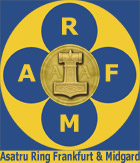
Asatru Ring Frankfurt & Midgard
Living with the Gods. Living for the Gods. Living
through the Gods.
The
Poetic Edda Online
In the translation of
Bellows
Lays of the Gods
Helreith Brynhildar
Brynhild's Hell-Ride
INTRODUCTORY NOTE
The little Helreith Brynhildar immediately follows the "short" Sigurth lay in the Codex Regius, being linked to it by the brief prose note; the heading, "Brynhild's Ride on Hel-Way," stands just before the first stanza. The entire poem, with the exception of stanza. 6, is likewise quoted in the Nornageststhattr. Outside of one stanza (No. 11), which is a fairly obvious interpolation, the poem possesses an extraordinary degree of dramatic unity, and, certain pedantic commentators notwithstanding, it is one of the most vivid and powerful in the whole collection. None the less, it has been extensively argued that parts of it belonged originally to the so-called Sigrdrifumol. That it stands in close relation to this poem is evident enough, but it is difficult to believe that such a masterpiece of dramatic poetry was ever the result of mere compilation. It seems more reasonable to regard the Helreith, with the exception of stanza 11 and allowing for the loss of two lines from stanza 6, as a complete and carefully constructed unit, based undoubtedly on older poems, but none the less an artistic creation in itself.
The poem is generally dated as late as the eleventh century, and the concluding stanza betrays Christian influence almost unmistakably. It shows the confusion of traditions manifest in all the later poems; for example, Brynhild is here not only a Valkyrie but also a swan-maiden. Only three stanzas have any reference to the Guthrun-Gunnar part of the story; otherwise the poem is concerned solely with the episode of Sigurth's finding the sleeping Valkyrie. Late as it is, therefore, it is essentially a Norse creation, involving very few of the details of the German cycle (cf. introductory note to Gripisspo).
Helreith Brynhildar
Brynhilds Hell Ride
After the death of Brynhild there were made two bale-fires, the one for
Sigurth, and that burned first, and on the other was Brynhild burned,
and she was on a wagon which was covered with a rich cloth. Thus it is
told, that Brynhild went in the wagon on Hel-way, and passed by a house
where dwelt a certain giantess. The giantess spake:
1. "Thou shalt not
further forward fare,
My dwelling ribbed with rocks across;
More seemly it were at thy weaving to stay,
Than another's husband here to follow.
2. "What wouldst thou
have from Valland here,
Fickle of heart, in this my house?
Gold-goddess, now, if thou wouldst know,
Heroes' blood from thy hands hast washed."
Brynhild spake:
3. "Chide me not, woman from rocky walls,
Though to battle once I was wont to go;
Better than thou I shall seem to be,
When men us two shall truly know."
The giantess spake:
4. "Thou wast, Brynhild, Buthli's daughter,
For the worst of evils born in the world;
To death thou hast given Gjuki's children,
And laid their lofty house full low."
Brynhild spake:
5. "Truth from the wagon here I tell thee,
Witless one, if know thou wilt
How the heirs of Gjuki gave me to be
joyless ever, a breaker of oaths.
6. "Hild the helmed in
Hlymdalir
They named me of old, all they who knew me.
. . . . . . . . . .
. . . . . . . . . .
7. "The monarch bold
the swan-robes bore
Of the sisters eight beneath an oak;
Twelve winters I was, if know thou wilt,
When oaths I yielded the king so young.
8. "Next I let the
leader of Goths,
Hjalmgunnar the old, go down to hell,
And victory brought to Autha's brother;
For this was Othin's anger mighty.
9. "He beset me with
shields in Skatalund,
Red and white, their rims o'erlapped;
He bade that my sleep should broken be
By him who fear had nowhere found.
10. "He let round my
hall, that southward looked,
The branches' foe high-leaping burn;
Across it he bade the hero come
Who brought me the gold that Fafnir guarded
11. On Grani rode the
giver of gold,
Where my foster-father ruled his folk;
Best of all he seemed to be,
The prince of the Danes, when the people met.
12. "Happy we slept,
one bed we had,
As he my brother born had been;
Eight were the nights when neither there
Loving hand on the other laid.
13. "Yet Guthrun
reproached me, Gjuki's daughter,
That I in Sigurth's arms had slept;
Then did I hear what I would were hid,
That they had betrayed me in taking a mate.
14. "Ever with grief
and all too long
Are men and women born in the world;
But yet we shall live our lives together,
Sigurth and I. Sink down, Giantess!"
Home - Poetic Edda - Next Drap Niflunga
© Michael Schütz – Asatru Ring Frankfurt & Midgard – www.asatruringfrankfurt.de